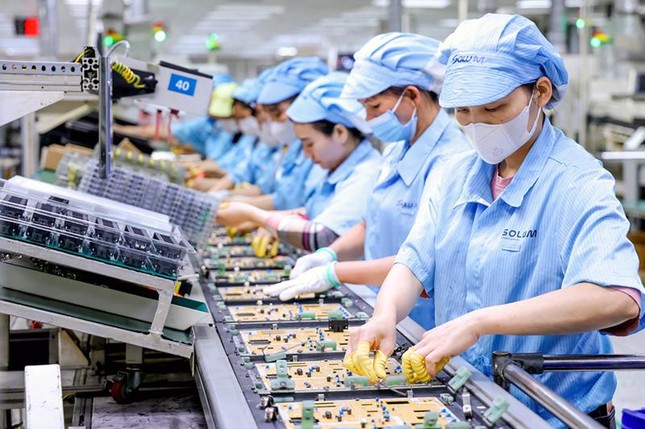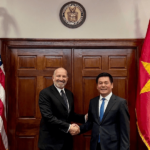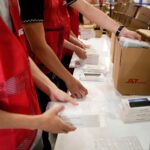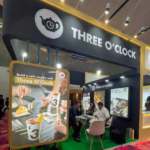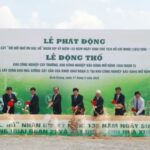Preferential treatment for high-tech enterprises
The draft amended Customs Law presented to the National Assembly introduces several innovations, aiming to significantly reduce clearance time and propose mechanisms to facilitate key economic sectors such as semiconductors, high-tech, logistics, and manufacturing.
One notable feature of this draft is the proposed expansion of preferential customs treatment for businesses operating in the high-tech sector, particularly semiconductors. Accordingly, manufacturers of microcircuits, electronic components, and high-tech equipment meeting specific criteria will be granted priority status, benefiting from expedited procedures, faster clearance, reduced physical inspections, and pre-arrival customs processing.
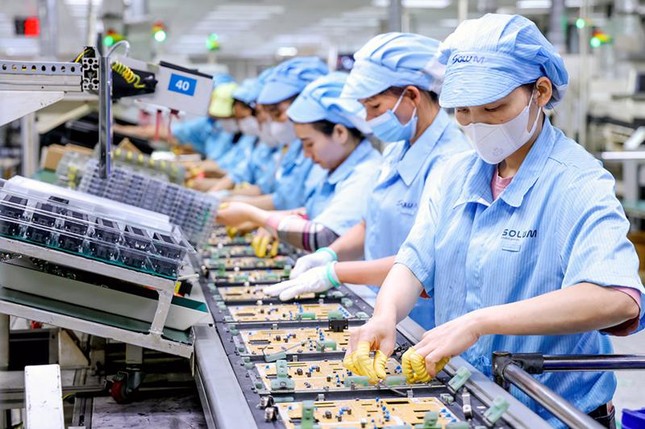
The draft proposes preferential treatment for goods in the high-tech and semiconductor sectors.
In terms of procedures, the draft law suggests allowing enterprises to submit customs declarations and receive routing results before the goods arrive at the port to shorten waiting times. It also emphasizes enhanced data sharing between customs and other ministries, such as agriculture, health, and industry and trade, to facilitate one-stop processing for specialized inspection goods and promote the digitization of logistics documents and data, from declaration registration to payment and post-clearance inspection.
Additionally, the draft introduces a new provision allowing innovative startups in the high-tech sector to benefit from a regulatory sandbox in customs procedures, enabling them to test new products and technologies within the framework of state risk control.
Notably, the draft commits to reducing clearance time to levels comparable to the ASEAN-4 countries: no more than 36 hours for exports and 48 hours for imports under normal conditions.
Preventing the “top-bottom disconnect”
In an interview with Tien Phong , Ms. Tran Thi Thuy Linh, Executive Director of an import-export enterprise in Ho Chi Minh City, shared that currently, 20-30% of declarations fall under the “golden route.” However, Vietnam’s customs procedures remain cumbersome, with bottlenecks in specialized inspections and a lack of data synchronization across ministries, resulting in significant time and cost burdens for businesses.
Compared to other ASEAN countries, Vietnam’s cargo clearance time lags by 1.5 to 3 times, negatively impacting the competitiveness of Vietnamese enterprises.
“If enterprises can make advance declarations, receive early routing, and shorten waiting times at ports, logistics costs could be reduced by 10-15%. Businesses aspire to strengthen the post-clearance audit mechanism and shorten the response time for customs procedures to less than 2 working hours, especially at major ports like Hai Phong and Cat Lai,” said Ms. Linh.

Customs procedures in Vietnam currently take a significant amount of time.
Mr. Nguyen Tuong, Vice Secretary-General of the Vietnam Logistics Services Enterprises Association (VLA), shared that according to a survey, the average compliance cost for completing a single administrative procedure for export and import in Vietnam is VND 2.01 million and VND 6.1 million, respectively. The average time to complete a transaction procedure is 14.9 hours, with 7.1 hours spent on port procedures to pick up goods, accounting for 46.7% of the total time.
The prolonged processing time results from the lack of synchronization between the National Single Window and the specialized inspection systems, causing delays and difficulties for enterprises.
In the context of digital development, Mr. Tuong emphasized that accelerating clearance time requires adopting a common data standard across relevant ministries and sectors to unify the system, facilitate cargo release, and streamline specialized inspections.
Notably, the draft amended Customs Law introduces a risk management mechanism that leans towards post-clearance audits instead of pre-clearance inspections. However, Mr. Tuong believes that a standardized procedure is necessary to ensure enterprises’ rights to complaint and rebuttal during post-clearance audits, preventing arbitrary retrievals without valid grounds.
Economist Nguyen Minh Phong commended the expansion of preferential treatment to high-tech sectors as a timely and necessary step. In Vietnam, approximately 1,400 enterprises operate in export processing zones, including over 100 foreign-invested enterprises in the electronics, high-tech, and machinery manufacturing sectors, belonging to prominent global technology groups such as Intel, HP, Samsung, Amkor, LG, Panasonic, and Sony.
With the ongoing shift in semiconductor production, Vietnam needs flexible mechanisms to attract these technology “giants.” However, Mr. Phong cautioned that the amended Customs Law must be accompanied by substantive and synchronized implementation by subordinate units. Otherwise, the goal of expedited clearance will remain elusive due to the persistent “top-bottom disconnect.”
“Vietnam: A Strategic and Alluring Market for US Businesses.”
U.S. Secretary of Commerce, Howard Lutnick, emphasized the significance of Vietnam as an attractive and important market for American businesses. He expressed his desire for Vietnam to continue facilitating investment projects from the United States, thereby expanding bilateral trade, particularly in terms of importing goods from America.
“J&T Express: Samsung Vietnam’s Trusted Technology Delivery Partner.”
J&T Express is proud to announce its partnership with Samsung Electronics Vietnam as their official logistics partner for tech product deliveries. This collaboration marks a significant step forward in enhancing the delivery experience for high-value electronic goods and reinforces customer confidence in online shopping.
Failure to Embrace Circular Economy Will See Logistics Businesses Left Behind
If logistics companies fail to embrace green practices and adopt a circular economic model, they risk facing significant challenges and falling behind in the global supply chain. The time to act is now, or businesses will face the consequences and struggle to keep up with the evolving demands of the industry.
“Leading Vietnamese Brands: Expanding Horizons Through Franchising in 2025”
“Regarding the risk of Mixue’s aggressive expansion in Vietnam through franchising, industry expert Nguyen Phi Van candidly shared, ‘Instead of blaming them for dominating the market, Vietnamese businesses should learn and adapt faster.’ “

